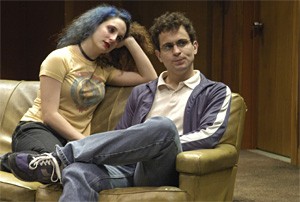Tossing around a little foam ball is fun because you can whip it fast and aim it anywhere, and nobody gets hurt. The theatrical equivalent — let's call it Commedia dell'Nerf — is now on display in All Hail Hurricane Gordo at the Cleveland Play House. And though it makes no lasting impact, it's mildly amusing while it lasts.
Written by young playwright Carly Mensch, the script leans heavily on aggressively quirky characters acting in surprising and humorous but ultimately less than interesting ways.
It all starts with twentyish Gordo playing a fast and loose game of Nerf basketball, first by himself and then with his slightly older brother Chaz. It turns out Gordo is developmentally challenged, with intense hyperactivity and a self-abusive anger reflex. (It also turns out he's got a pretty good jump shot.)
Gordo is completely dependent on Chaz, who works two jobs and spends the rest of his time writing letters to people he finds in his massive collection of phone books. Their parents have split and they are on their own, until Chaz decides to advertise for a roommate to help with the finances.
Enter a young female renter named India, who either Mensch or the director, Sean Daniels, decided should share many of the manic characteristics of Gordo. All pop-eyed and trembling with nervous energy, India (an initially overtorqued Tracee Chimo) decides the boys' hovel is perfect. So she moves in and, as characters in quirky plays do, brings only a small satchel and a French horn case with her.
Although they don't appear to share many hereditary physical characteristics, Patrick James Lynch (who plays Gordo) and Matthew Dellapina (Chaz) wrestle believably as brothers, both literally and figuratively. But moments when Chaz tries to reflect on his destiny in life — as Gordo's full-time baby-sitter — never go beyond easy kitchen towel aphorisms.
In the second act, the wild and crazy emoting calms a bit, and India's dad, Oscar, shows up, portrayed by William McNulty with a welcome air of gruff sanity. Demonstrating different anger-management techniques than Gordo, who prefers running into walls, Oscar gives Chaz a tutorial on familial love and commitment. It's another example of playwright Mensch's ear for dialogue. But ultimately, the strained story is a bit too pat to be truly engaging.


